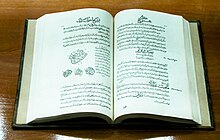The Canon of Medicine

Persian version of The Canon of Medicine at Avicenna's mausoleum in Hamedan
|
|
| Author | Avicenna |
|---|---|
| Original title | القانون في الطب |
| Language | Arabic |
| Genre | Medical literature |
| Published | 1025 (Arabic) |
The Canon of Medicine (Arabic: القانون في الطب al-Qānūn fī al-Ṭibb) is an encyclopedia of medicine in five books compiled by Persian philosopher Avicenna (Ibn Sina) and completed in 1025. It presents an overview of the contemporary medical knowledge, which had been largely influenced by Galen.
The Canon of Medicine remained a medical authority for centuries. It set the standards for medicine in Medieval Europe and the Islamic world and was used as a standard medical textbook through the 18th century in Europe. It is still used in Unani medicine, a form of traditional medicine practiced in India.
The English title The Canon of Medicine is a translation of the Arabic title القانون في الطب (al-Qānūn fī aṭ-Ṭibb), with "Canon" used in the sense of "law". The word Canon derives from the cognate Arabic original Qanun (the English word "canon" comes from Latin canōn, from Ancient Greek κανών (kanón, "measuring rod, standard"), while the Arabic qanun comes directly from the same Ancient Greek root).
The medical traditions of Galen and thereby Hippocrates, had dominated Islamic medicine from its beginnings. Avicenna sought to fit these traditions into Aristotle's natural philosophy. He began writing the Canon in Gorganj, continued in Rey and completed it in Hamadan in 1025. The result was a "clear and ordered "summa" of all the medical knowledge of Ibn Sīnā's time" It served as a more concise reference in contrast to Galen's twenty volumes of medical corpus.
The Canon of Medicine is divided into five books:
Book 1 is made up of six theses which give a general description of medicine in general, the cosmic elements that make up the cosmos and the human body, the mutual interaction of elements (temperaments), fluids of the body (humours), human anatomy, and physiology. The book explains the causes of health and disease. Avicenna believed that the human body cannot be restored to health unless the causes of both health and disease are determined. He defined medicine (tibb) as follows:
...
Wikipedia
